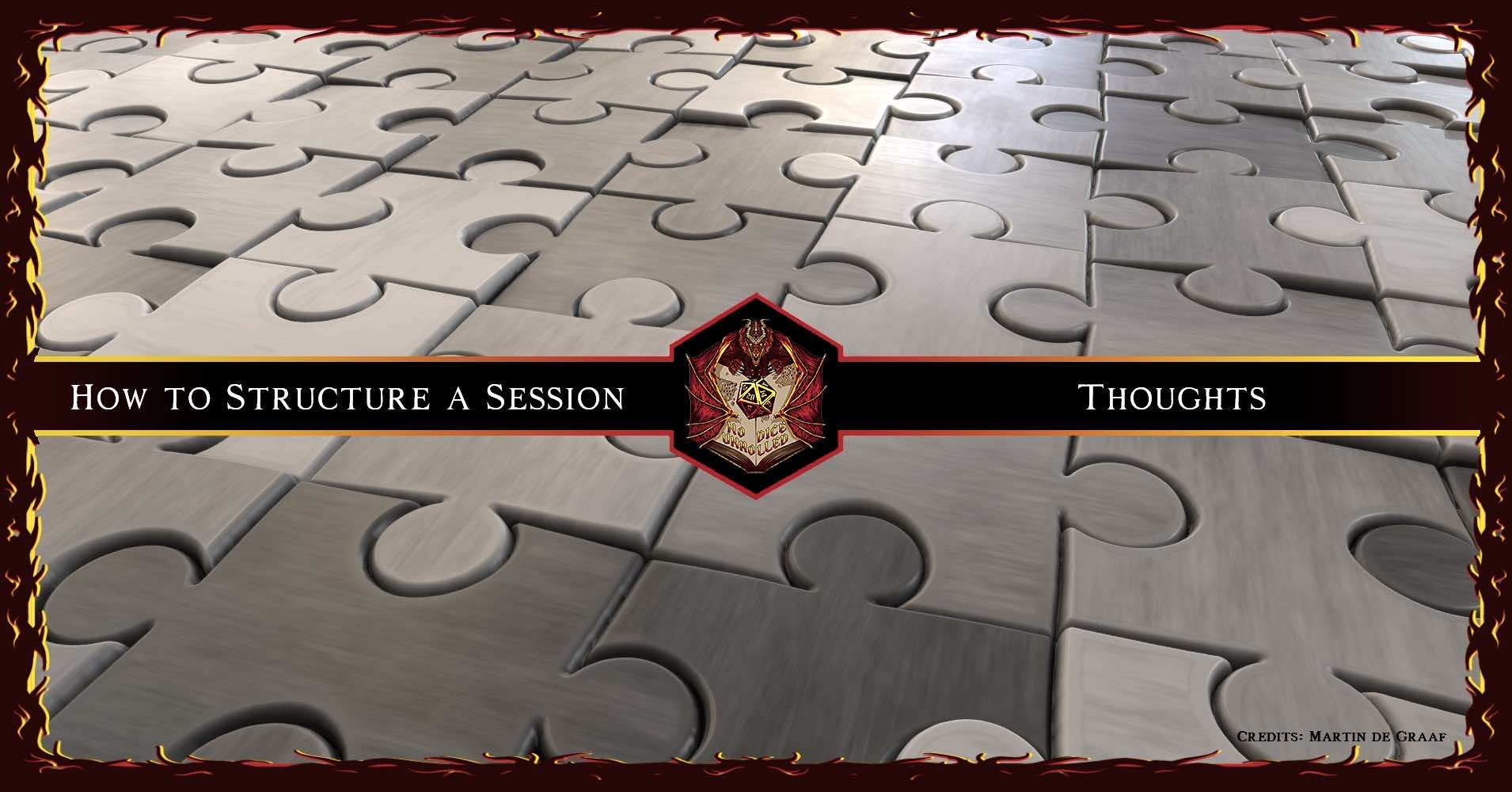This article was born from the ideas provided by two manuals that I read: Agents of Concordia and The Burning Wheel, (the game I am falling in love with, see the article on my relations with the campaigns). In both there are sections dedicated to explaining how to structure a game session, providing different approaches and ends. Obviously they are not the only games that give explicit advice on the subject, but they provide a good starting point for talking about it. If anyone has other games or articles that might add to the discussion, please let me know!!
This article dels with the topic regarding tabletop RPG sessions. Although part of the discussion can also be applied to virtual tabletop gaming, some aspects are profoundly different between them.
Should we talk about how to structure a session?
The ultimate goal of roleplaying is essentially to have fun. In pursuit of that goal I am very liberal. Changing rules, removing limits, adding exceptions, changing statistics, taking one aspect of a game and using it for another. Anything you like can be done, as long as there is consensus among the players and doing so improves the gaming experience. Just to be clear, this doesn’t mean I make such changes often – quite the contrary – I simply have no problem doing so.

Consequently, even individual gaming sessions should be structured to suit your preferences, as long as it works. Each group has its own habits, its own situation; there is no one paradigm for everyone. But it is always good to stop occasionally and look at the situation, to see what the other players suggest. Maybe there is an interesting idea you didn’t think of.
Let’s see what Agents of Concordia and Burning Wheel suggest.
The session for Agents of Concordia
The Agents of Concordia manual divides the session into five parts.

First, De-derping. It starts from the assumption that you have a good relationship with your fellow players, so you should give the group about twenty minutes to socialize, talk about how life is going, outside interests, and so on. This is done to avoid these discussions coming out in the middle of playing the game, disturbing the focus and mood.
Second, set the mood. This means finding the right lighting, perhaps some appropriate music, but also turning off any distracting display screens and putting smartphones away.
Third, immersion. With all external sources of distraction gone, it’s time to focus attention. Give the players a moment to collect their thoughts and focus on their characters. Ask how each individual character feels and asks each one a simple question: what is your favorite food or a childhood memory? But each time a different question. This is to help players to start thinking like their alter ego, to connect better with their companions in-game.

Fourth, recap. Recapitulate where the plot stands, what happened in the last session and where it ended. This helps the players to re-enter the story, to immerse themselves in it once again. It also helps any players who were absent previously to fill in the gaps. Personally, I would also say it allows the GM to understand how much of previous in-game events and story elements the players remember. This is very useful feedback because what they say and how they say it make a valuable statement on how strong a grip the game had on them.
Fifth, it’s finally time to play!
The session for The Burning Wheel

The Burning Wheel manuals are full of good concepts and ideas, but they don’t explicitly tell you how to structure a session. However the particular system of the game suggests elements of that structure.
The Burning Wheel system has neither Experience Points or Levels. The skills that are used are improved and this happens only if a certain number of tests of a certain difficulty are made. There is a point-based system which rewards the interpretation and achievement of certain set goals. These are called “Artha”. The points of Artha obtained during play can be spent to facilitate the tests or to obtain particular advantages or improvements.
In order to understand if each individual character’s actions are worthy of one or more points of Artha, ending the session fifteen minutes early is suggested, so that time can be used to read the interpretative descriptors aloud (specifically the Beliefs and the Instincts) of each character. In this way it is clear whether the facets, the objectives and, more precisely, the convictions of each character came out during the evening’s play. It is a moment of personal evaluation and constructive confrontation with others on what the characters have successfully expressed and in what aspects they were neglectful.
The importance of immersion
One of the reasons I decided to write this article was the first point described by the authors of Agents of Concordia. With the forced need to connect online to continue playing, I realized how much of the small-talk that takes place before the session I am missing because of the online interface. In addition to this, my ability to read the expressions, the stares, the moments of collective hilarity among the group is also greatly diminished under the current conditions. Because of the internet connections, my companions and I really only have the audio, and that with sub-optimal quality at times. Nostalgia for playing face-to-face at the table led me to think about my gaming sessions and then about this article.

As I have already written, the suggestions listed above should not be considered clear rules, to be applied with a timer and a timetable. These are interesting ideas. Some of these are probably already being used by many of us, more or less consciously. I really enjoyed the immersion time suggested by Agents of Concordia. The idea of not just starting, but of first directing the players’ minds and concentration towards an optimal game situation is really useful. It is even more so if you implement a small study of each character as a tool to guide them.
The value of debriefing
The Burning Wheel gives different sorts of suggestions because of its story-telling/narrative elements, making its advice less than universal for those playing traditional tabletop RPG’s. For other hybrid games, however, their suggestions can be useful.
When you create a character you often consider his past, his tastes, his appearance, and other details. Many times, however, you gradually lose contact with his (original) basic nature as you rack-up more and more hours with a given character, and begin to only consider the current plot and recent events. An NPC mentioned in the background, a promise made in the early sessions, the consequences of interactions with key NPC’s in the past, an object kept in the backpack and never considered again.

To help guard against this, I would borrow not only the final 15 minutes suggested, but include the idea of writing down the main character points and motivational descriptors on the character record sheet. Whether the practice connects with the rules of the system or not, these are useful in staying focused on setting and event interpretations for role-play and in-game character choices.
One last consideration on how to structure a session
I hope you take the time to really consider these suggestions . I reflected on them as I was writing, and really came to realize that we must not forget that we can always improve the way we structure a session, even if our sessions already amuse us as they are.
I know that the ideas presented here cannot be universal, but I am sure that in many cases they could make the difference between structuring a role-PLAYing game or a ROLE-playing game.

